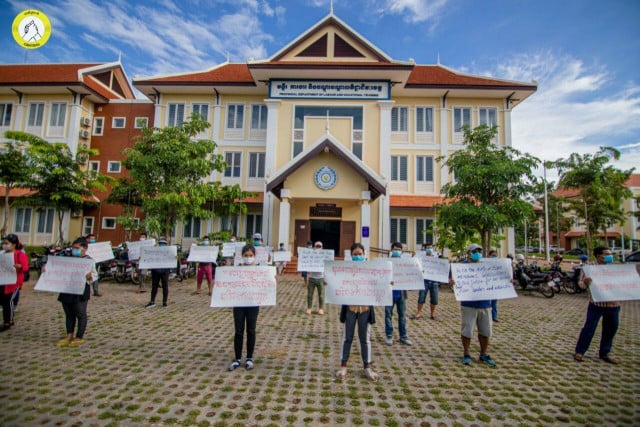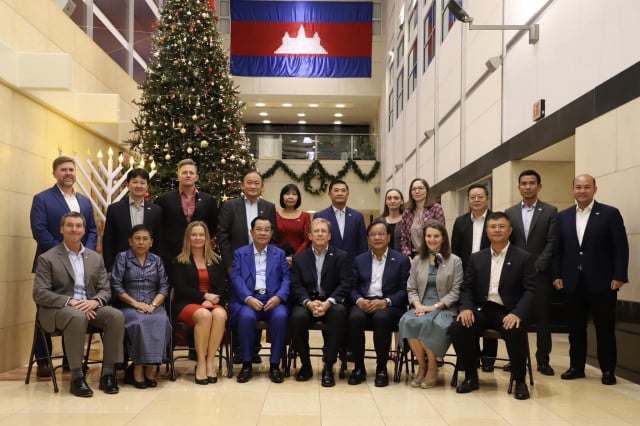Staff at Le Meridien Angkor Hotel Demand Reinstatement of Union Activists

- Gerald Flynn, Lay Sopheavatey and Vantha Phoung
- August 5, 2020 8:22 AM
Three union members were dismissed after requesting less severe pay cuts, but now the government is refusing to treat the court as a joint dispute, denying the workers access to arbitration.
PHNOM PENH--A dispute has arisen between the Siem Reap Provincial Department of Labor, representatives of Le Meridien Angkor Hotel and trade unions over the hotel’s decision to dismiss of three union members.
The three female workers, who have each worked at the hotel for more than 10 years, were dismissed after requesting the hotel reduce the cuts to salary from 35 percent to 20 percent. All three were dismissed in between July 9 and 10, 2020.
On Aug. 3, the hotel representative and the Siem Reap Provincial Department of the Labor continued to object to the union's request to file a dispute of three employees' representatives as a joint dispute.
Some 40 Le Meridien Angkor employees called upon the hotel manager and the provincial labor department to take the case as a joint dispute for the three women who were fired. In addition to reinstating the women, the union is reiterating the dismissed workers’ call for an increase of wages to 80 percent of full salary rather than 65 percent and they also requested that hotel management stops verbally abusing its staff.
The general manager of Le Meridien Angkor was not available for comment when contacted on Aug. 5, 2020.
Despite the Department of Labor maintained that each of the dismissed workers would be judged on an individual case, meaning that their dispute cannot be taken to the independent and impartial Arbitration Council. This would leave the three workers with no other legal recourse but to take Le Meridien Angkor to court and would deny the remaining hotel staff the right to legally go on strike according to the 2016 Trade Union Law.
“Union representatives walked out when the Department of Labor still decided to file this dispute as individual disputes, we cannot accept that,” Touch Kosal, president of the Cambodian Federation of Tourism Workers' Unions said.
Touch Kosal said that the department's decision was incorrect because the three workers' representatives demanded the benefit for all employees and the hotel manager fired them. Therefore, this dispute must be considered as a joint dispute for the Arbitration Council to resolve.
The hotel representatives in the negotiations claimed that the decision was warranted because the dismissed workers had shared information on social media that tarnished the hotel's reputation.
Damage to the name of the hotel disqualified the case for a joint dispute status, according to Pheng Chhengly, chief of the labor office at the provincial Labor Department.
“This decision was made in accordance with the law because the representatives of the three employees who were fired shared bad information about the hotel to defame the hotel, so they were fired. And the defamation was not for the common interest, we consider it a personal dispute,” Chhengly said.
Touch Kosal explained that the hotel had accused the three dismissed women of inciting a protest, but Kosal argued that these protests took place because the hotel staff disagree with the conditions set by the managerial team.
The union leader claimed that the workers would continue to make demands on the three points previously demanded and did not accept the authorities’ decision on the afternoon of Aug. 3.
Workers’ Rights Diminishing in Cambodia
However, for Patrick Lee—a legal advisor working for labor rights group CENTRAL—the Siem Reap Provincial Department of Labor’s decision reflects a broader problem.
“On this, one of the big issues with the Trade Union Law, and it’s been highlighted again in this case at Le Meridien, is how it inadequately protects union leaders and activists from acts of discrimination and harassment, like dismissal,” he warned, adding that trade union activists lack the protection from dismissal enjoyed by elected union leaders which is why the three women were dismissed by the hotel.
Lee maintained that if the case were put before an independent body like the Arbitration Council then the three women would be reinstated in their former positions, but noted that the Labor Department had denied the women that right.
“Refusals to classify demands for reinstatement of union leaders as collective disputes by labour department officials are certainly becoming increasingly more common,” he added, citing a similar case where the Phnom Penh Labor Department refused to recognize union leaders’ demand for a collective dispute against the Roo Hsing Garment factory in May 2020.
While the exact number of cases brought to the Arbitration Council over the years is unclear, the number of arbitral awards handed out by the council has declined dramatically since the 2016 Trade Union Law.
In 2014, some 233 decisions were awarded by the council, another 240 awards were issued in 2015 compared to 180 in 2016, 49 in 2017, 39 in 2018 and 76 in 2019. So far in 2020, the Arbitration Council has issued 39 arbitral awards in labor dispute cases, highlighting the shift in approach from the government and employers to avoid workers from having their case heard by the independent body.
“The Arbitration Council has, on multiple occasions in previous cases, found that such demands constitute collective labor disputes,” explained Lee. “In this sense, the law in its current state places too many procedural obstacles that make it unacceptably difficult for trade union leaders and activists to have their cases heard in front of internationally-recognized independent and impartial institutions like the Arbitration Council.”
For Kosal, the attacks on unions are deliberate—he has seen a growing number of attempts to weaken the union movement in Cambodia.
“In my opinion, the government seems to think we will just resist everything they or the employers suggest, but all we want to do is protect the rights of workers and find solutions for union members when they aren’t given the benefits and rights that they’re entitled to,” said Kosal.
This comes after prominent unionist Rong Chhut was arrested on July 31 and charged with incitement to cause serious social chaos. He could face up to two years in prison after being accused of criticizing the Cambodian government’s border negotiations with Vietnam.















